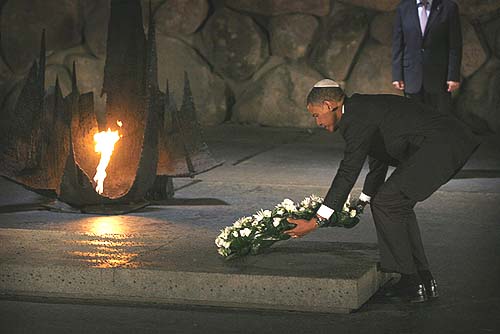Photo Credit: Michal Fattal / FLASH90

As leaders from more than 40 countries gather in Jerusalem on Thursday for the Fifth World Holocaust Forum, marking the 75th anniversary of the liberation of Auschwitz, it is worth reviewing the changes to Israel’s role in the fight against global anti-Semitism over the past half century. It can be said that as anti-Semitism and anti-Zionism have merged into a single beast, the State of Israel has moved from indifference to active involvement.
The State of Israel has not always seen the struggle against global anti-Semitism as its fight. For the first 25 years of Israel’s existence, the unspoken attitude in Jerusalem was that if Jews abroad had a problem with anti-Semites, they could always immigrate to Israel. Immersed in the business of building and defending the Jewish state, Israel’s leaders had no time for “troubles of the Diaspora.”
‘);
_avp.push({ tagid: article_top_ad_tagid, alias: ‘/’, type: ‘banner’, zid: ThisAdID, pid: 16, secure: true });
Attitudes began to change after the Yom Kippur War. The campaign of political delegitimization against Israel launched by Arab countries led to the infamous 1975 “Zionism is Racism” resolution at the United Nations, alongside an avalanche of propaganda that blended anti-Semitism with anti-Zionism. Israel began to take notice. But still the prevailing attitude in Jerusalem was that anti-Semitism was a Diaspora problem for Diaspora Jews and their host countries.
However, after the 1980 Rue Copernic synagogue bombing in Paris and other terror attacks, then-Prime Minister Menachem Begin took the decision to have Israeli intelligence officials begin advising Jewish communities abroad on security measures. Response to global anti-Semitism thus found a concrete place on Israel’s national agenda.
In 1988, Cabinet Secretary Elyakim Rubinstein (who later became a Supreme Court justice) established an “Inter-Ministerial Forum for Monitoring Anti-Semitism,” and expanded it to include Diaspora Jewish representatives and academic experts. The Forum compiled reports on anti-Semitism around the world and eventually won a place on the Israeli Cabinet’s agenda, reporting once a year.
With the disintegration of the communist bloc, an enhanced role for Israeli diplomacy regarding anti-Semitism also became possible, and more necessary. Jerusalem intervened and pressed for government crackdowns on official and street manifestations of anti-Semitism in the emerging states of the former Soviet Union.
The wave of neo-Nazi violence that swept Germany in 1993 generated public demand for Israeli government action against anti-Semitism, too. The Knesset held its first-ever special debate on the matter, and one former Mossad chief suggested publicly that Israeli agents act against neo-Nazi leaders.
In 1997, Cabinet Secretary Danny Naveh assumed Israeli government responsibility for combating anti-Semitism, and advocated global legislation that would limit access to sources of hate literature such as neo-Nazi websites on the Internet. Many American Jewish groups opposed this approach, however, because it suggested limits on free speech.
In retrospect, this was a terrible mistake, considering the monstrous proportions to which anti-Semitism on social networks and the web has grown. Belatedly, everybody now agrees that combating “cyber hate” is a top priority, and Israel’s Justice Ministry even has a department dedicated to the fight against online incitement.
Nevertheless, back then some American Jewish leaders felt that global anti-Semitism wasn’t Israel’s fight, that the struggle to educate and legislate against anti-Semitism should be left to them. They resisted Israeli attempts to lead or coordinate anti-anti-Semitism activity.
The watershed moment that changed this—that clarified how anti-Semitism had become a strategic threat to Israel and to Jews everywhere, requiring global coordination—was the 2001 World Conference against Racism (under United Nations auspices), known as Durban I. That conference turned into one of the greatest displays of organized anti-Jewish and anti-Israel hate ever, with the two maladies becoming a blended, noxious potion.
Shortly afterwards, in 2003, Israeli Minister for Jerusalem and Diaspora Affairs Natan Sharansky (a noted human rights activist) founded the Global Forum against Antisemitism, under the auspices of the Israeli Prime Minister’s Office. (Working for Sharansky, I was the coordinator of the Global Forum). This brought together Jewish leaders and intellectuals from the Diaspora with all relevant Israeli agencies.
“The State of Israel has decided to take the gloves off and implement a coordinated counteroffensive against anti-Semitism,” Sharansky said. “The State of Israel will play, as it always should, a central role in defending the Jewish people.”
Sharansky’s intellectual leadership brought discipline and focus to global Jewish community activity against anti-Semitism.
Sharansky’s Global Forum drew attention to the mass production of violently anti-Semitic and genocidal propaganda in the Arab and Islamic worlds, with Egypt and Iran at the center of the spreading poison. The Forum also highlighted the dangers of online hate.
Most importantly, Sharansky innovated a critically important effort to expose anti-Semitism that was cloaked as “mere opposition” to Israel and Zionism. He showed how anti-Zionism often employs the same tactics of demonization, discrimination and double standards against Israel that anti-Semites historically (and still today) use against Jews, and with the same aim—to strip Jews and/or Israel of rights or power.
He then introduced a benchmark—the “3D test”—for distinguishing legitimate criticism of Israel from anti-Semitism, by scrutinizing criticism of Israel for demonization, double standards and delegitimization. Use of these tactics mark the devolution of commentary about Israel into the dark zone of anti-Semitic expression and intent, Sharansky argued.
Subsequent meetings of the Global Forum became opportunities for non-Jewish political leaders from around the world to learn about the many confluences between anti-Semitism and political attacks on Israel, and to increasingly speak out against this phenomenon.
In 2010, then-Canadian Prime Minister Stephen Harper embraced Sharansky’s 3D definition as his own, in a compelling speech delivered at an Ottawa meeting of the Inter-Parliamentary Coalition for Combating Antisemitism.
In 2016, the International Holocaust Remembrance Alliance (IHRA) adopted a working definition of anti-Semitism based on Sharansky’s work. The IHRA definition explicitly recognizes that anti-Zionism—the delegitimization and demonization of the Jewish state—is a clear and unequivocal expression of anti-Semitism.
Even the U.N.’s Special Rapporteur on Freedom of Religion or Belief noted in a report last year to the U.N. Human Rights Council that “there is an alarming rise in anti-Semitism of the extreme left, in which individuals claiming to hold anti-racist and anti-imperialist views use antisemitic narratives or tropes in the course of expressing anger at the policies or practices of the Government of Israel.”
Similarly, former Canadian Prime Minister Harper recently warned (in a Jerusalem address): “In much of the Western world, the old hatred, crude anti-Semitism, has been translated into more sophisticated language for use in polite society. People who would never say they hate and blame the Jews for their own failings or the problems of the world, instead declare their hatred of Israel and blame the only Jewish state for the problems of the Middle East.”
Pushing back against this, the Canadian and British governments have formally adopted the IHRA definition of anti-Semitism as part of their anti-racism strategies, and subsequently offered full-throated rejections of BDS, too. The German Bundestag also has condemned BDS’s “methods and motives” as anti-Semitic.
Most recently, the U.S. government recognized Jewish university students as a class protected from discrimination under Title VI of the Civil Rights Act, referencing the IHRA rubric as its baseline definition of anti-Semitism.
As raw anti-Semitism round the world has risen over the past 20 years and has morphed into virulent anti-Israel sentiment—making the two phenomena almost indistinguishable—the State of Israel indeed has moved from indifference to active involvement in the struggle against such hate.
Israel’s Strategic Affairs Ministry has made this a focus of its activity. Last year it documented more than 100 examples of global BDS activity (i.e., attempts to boycott, divest from, or sanction Israel) which clearly qualify as anti-Semitic in tone and effect. This includes brute intimidation of, and discrimination against, Jewish and Israeli students on Western university campuses.
Israel also has sought to dialogue with the international human rights community on these matters. But groups such as Amnesty International, Human Rights Watch and the World Council of Churches have studiously ignored the IHRA framework or rejected its definitions. In fact, they frequently stray into anti-Semitic territory in their incessant and fierce criticism of Israel. They also have consciously ignored the vast amounts of anti-Semitic materials emanating from Arab and Islamic countries.
Nevertheless, almost all Israeli leaders today believe that the Jewish state must continue to play a role in highlighting and trying to combat both the “old” anti-Semitism and the “new” toxic new blend of anti-Semitism and anti-Zionism.
The convening of the Fifth World Holocaust Forum in Jerusalem by Israeli President Reuven Rivlin is part of this effort.
Israel expects world leaders coming to the conference not only to memorialize Holocaust victims. Israel expects world leaders to commit themselves to concretely fighting anti-Semitic expression and activity in their own countries—in consonance with the IHRA definition of anti-Semitism, and in a way that protects Israel’s place in the world at a time when the very legitimacy of a Jewish state is under assault.
‘);
_avp.push({ tagid: article_top_ad_tagid, alias: ‘/’, type: ‘banner’, zid: ThisAdID, pid: 16, onscroll: 10 });



